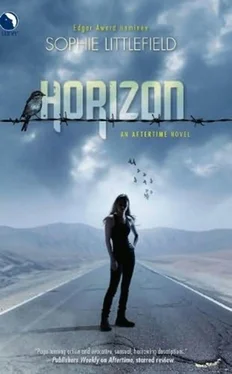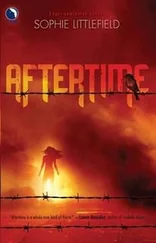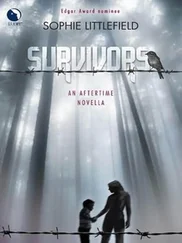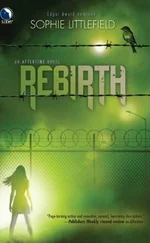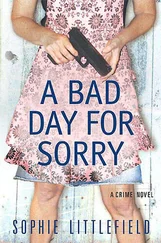“But…”
But they didn’t deserve to die. Smoke didn’t say it, but the truth hung between them like a palpable thing. His actions were self-defense, she wanted to say, and that was true, but she also knew Smoke, knew how he thought and felt. Honor was everything to him, and valor and retribution. He’d nearly died exacting vengeance, and now she wondered if he would punish himself since there was no one else to do the job for him.
But weren’t his weeks of pain, his scars, his severed fingers and broken bones enough?
They resumed walking, holding hands now. The children stopped playing, lulled by the motion of the trailer, and fell asleep like a litter of puppies, sprawled together in a heap. Red took over the trailer duties for Ingrid, and Zihna moved through the crowd talking to the most distraught.
When they came to a prefab ranch house whose windows were all smashed, the leaders in front pulled in and word traveled through the crowd that they were taking a break. Water and crackers were distributed. After Cass checked on Ruthie, still sleeping next to Twyla and Dirk, she took her ration and found Smoke sitting with his back against an old live oak whose gnarled branches had once shaded an above-ground pool, now crushed and seeping brackish water. He made room for her and patted the ground next to him.
“Look,” he said. “I just wanted to say…whatever went on, while I was in the hospital…”
“I’m sorry. Oh, Smoke, I’m so sorry, I-”
“No. I want to put it behind us, starting now. I don’t-none of it’s your fault. We’re together now, and that’s what matters.”
“I came to see you at first,” Cass said, unable to cast off her guilt that easily. “I came every day. But you were so…broken.”
“Cass.” He tipped her chin up with his fingers so that she would have to look at him. “Please, listen to me. I mean, really listen. I don’t blame you for not coming. I don’t…if it had been you, if I thought I’d lost you, if I thought you’d never wake up-”
His voice cracked and he swallowed hard before he could continue. “I wouldn’t have been able to come either. I don’t think I could bear it.”
Cass wanted to let his words heal her, wanted to take hold of the branch he offered her. But instead, her guilt grew. It hadn’t been fear of losing him that kept her away, not entirely. Smoke hadn’t even been gone from the Box forty-eight hours the first time she fucked Dor, and since then it had been practically every opportunity they got. Yes, their coupling was a comfort, a desperate response to fear, to despair, but it was a comfort she couldn’t seem to get enough of.
If Smoke knew how often she’d been lying in Dor’s arms while he was struggling for his life, could he still forgive her? If he knew that sometimes, when Dor touched her, she was glad of the forgetting, glad to have Smoke out of her mind, glad to have everything out of her mind, would he still want her back? What if he knew that the only time she didn’t want a drink was when Dor was inside her?
How could Smoke ever look upon her with anything but disgust when he understood what she had really become?
He would turn away from her and it would be what she deserved; he would reject her and she would know it was her due. And in one small way it would make everything easier. Because if Smoke didn’t want her she would never have to choose between two men. And if he didn’t expect her to be good then she could continue to be bad, to fail everyone and everything. As long as she took care of Ruthie, Cass could simply cease to try in any other way.
THEY PASSED AN uneasy night on a dirt track that had once been used for stock-car racing. By the looks of it, several years had passed since the stands had been filled with crowds, but the travelers were exhausted and on edge. Despite their promises to explain what they were doing on this side of the Rockies, Mayhew and his men kept to themselves, taking posts around the perimeter of the track along with a few of the others, and no one had the energy-or temerity-to complain. Dana and Owen slept under the overhang of the sagging snack stand; everyone else clustered close on the center of the track, where grass once grew and kaysev now provided a soft surface.
In the morning, a hasty meal quickly gave over to repacking the vehicles and other preparations for travel. Yesterday’s fears seemed both distant and magnified; few had slept well, and there was a general sense of wanting to put distance between them and the bloody battlefield they’d left behind. Surely Cass was not the only one to realize that the Beater threat was undiminished, no matter how much ground they covered today-as numerous as grains of sand on the beach, they would always be out there-but by the time the pink dawn gave way to day, they were on the road again.
The progress of the crowd was frustratingly slow. They stuck to the road, leaving the meandering waterways of the Delta behind for the flat farmland south of Sacramento, passing skeletal orchards only now beginning to come back to life, acres of table grapevines that were nothing but dead, woody spirals clinging to supports. At the end of the rows of vines, the rosebushes planted to give farmers early warning of fungal diseases were beginning to send up new shoots from the hardy rootstock that had waited, dormant, for more hospitable times, and Cass tried to interpret the appearance of the reddish canes as a hopeful omen.
They skirted small towns, taking farm roads to avoid the possibility of Beater nests. They passed shacks, ranches, commercial buildings; fairgrounds and schools and stadiums, and at a distance it all seemed almost normal from time to time, a walk in the country on a long-ago day when one’s only concerns were sunburn and getting home in time to catch the game on TV.
At least the day was warm and clear, and the roads were mostly passable. Twice they had to go around obstructions, using the Bronco to drag the little hybrid up a steep grade next to a wreck at one point while the walkers edged past on the narrow shoulder and tried not to look inside the smashed cars at the long-decayed bodies inside. They had spotted no Beaters by the time they paused for lunch in the shade of a billboard advertising the Silver Bear casino, a fact that buoyed flagging spirits and seemed to support the idea that the creatures were avoiding the sparsely populated countryside.
In the afternoon tempers began to fray. Smoke refused to ride until he’d completely exhausted himself, and it was hard to watch his limp get worse as the day wore on. Ruthie and Twyla darted around him playfully when they weren’t riding on the trailer.
Only the children were in good spirits. They danced along the road, gathering pebbles, and picking the occasional dandelion or wild orange poppy growing at the side of the road. Occasionally Ruthie would come to Cass to be picked up, snuggled, reassured. She would bury her face in Cass’s shirt for a few seconds and then she’d wriggle down again, not wanting to miss any of the fun with the other kids.
Cass marveled at this little cycle. Courage was not that hard to come by for children. No matter the hardships they faced, given a little love and encouragement, their spirits rebounded and thrived. After everything Ruthie had been through, she was a normal, happy little girl again.
Adults were different. Their habits and experiences made them inflexible, welding their routines in place, cementing their hurts and joys to create expectations of life that were not in line with the new realities. All around her Cass saw the dazed expressions and bleak weariness that were the hallmarks of the early days of the Siege. When the president made his final broadcast a few days before the media shut off forever, already secured in the secret location from which his administration intended to “navigate the crisis,” a phrase that was repeated first with reverence and then with derision-when the infected entered into the new phase of the disease and began picking at their skin and mumbling, when riots destroyed entire neighborhoods-that was when you began to see people with expressions like these. That was when they first took to the roads, driving their cars until obstacles prevented them from going any farther, then carrying their suitcases and their children until, in so many cases, they simply sat down in the street and gave up.
Читать дальше
Конец ознакомительного отрывка
Купить книгу
